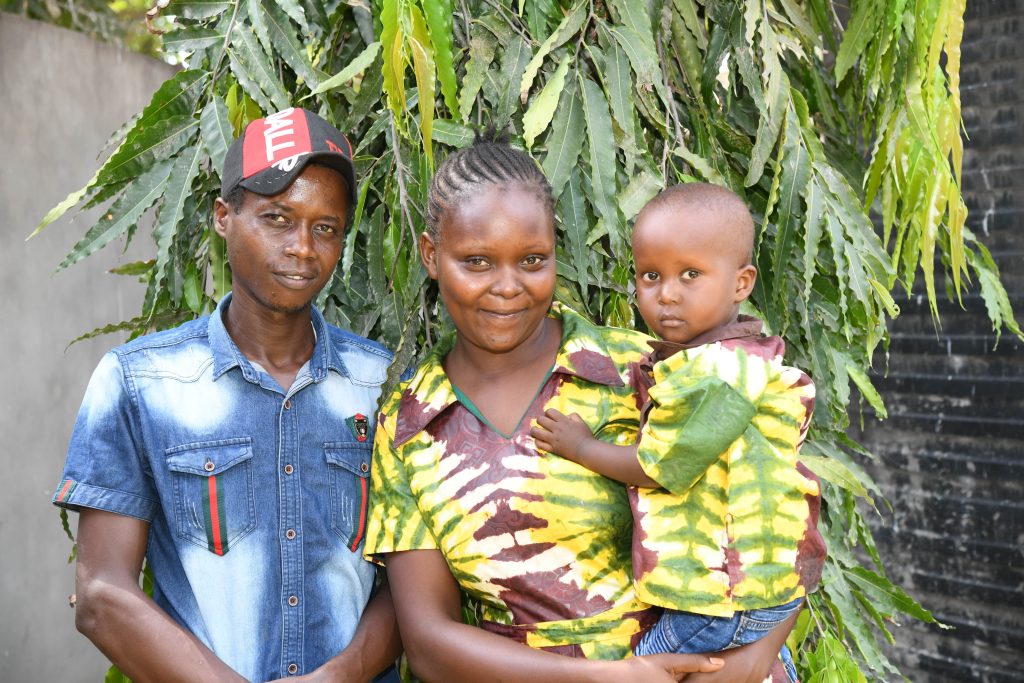Mombasa Family Wins Battle Against TB

Nancy from Mshomoroni narrates how her two and a half-year-old son battled TB. The visits she made to numerous clinics bore no fruit. She carried her son’s pain. His neck was swollen. He had rashes, was coughing constantly, and had lost his appetite completely.
“I had taken him to another facility where an x-ray had been taken on the swollen neck, but nothing was found. We were given antibiotics and advised to go back home, wait and see what changes would happen to the swelling on his neck,” she says. “This is when I started buying over-the-counter drugs from chemists, but my son’s condition never changed.”
At some point, a pharmacist said her son had a blood infection. He encouraged her to keep on giving her son the prescribed medicines, saying that with time, he would be well.
“There came a time when my son started vomiting whenever I gave him food. It was disturbing, but I resolved to keep on giving him his medication, hoping that he would get well.
Vincent, who is 2.5 years old, fell ill in March 2022. His parents struggled for a long time without knowing what exactly ailed their son until he was diagnosed with TB in October 2022. They were only three at home. They kept wondering where their son got TB.
The mother resolved to visit Mlaleo Health Center, where he was diagnosed with TB and put on treatment immediately. After a short while on medication, his condition improved. The swelling on his neck disappeared; he regained his appetite and became active and playful. Upon contact tracing, his father Charles Mulami was diagnosed with TB as well.
According to Mulami, he underwent untold suffering before he was diagnosed with TB. It all started with fever and would feel very tired and sweat heavily at night. His persistent cough was worrying. Like his son, he visited a number of pharmacies, but the more he took over-the-counter drugs, the more his condition worsened.
“My child whom I was close to became ill. When he was found with TB, the doctors requested that I accompany my wife and child to the hospital as we were staying together. I was diagnosed with tuberculosis after being tested. I was put under treatment as well, and so far, I can say that my condition has improved.” Mulami says.
He perceives that his exposure to TB occurred during his short stay at Kajiado Prison.
“The person I shared a cell with had signs of TB based on what I know now,” he adds, “but I didn’t know it was TB because I hadn’t seen a person who had TB before.”
When his wife informed him that their son had TB, he said to himself that he also had TB. His son might have gotten TB from him. He had his own fears and never wanted to be tested. He is thankful that the healthcare workers screened, tested, and counseled them about TB.
Even though he feels okay, he is still taking his medication as advised by doctors.
“I never knew that one could get cured of TB. “I assumed that once a person was diagnosed with tuberculosis, they would be on medication for life and would never recover,” he adds.
He has since changed this perspective because his condition has improved after being on medication for a short while. Within two weeks of treatment, he had started seeing changes. The persistent cough and fever that had troubled him vanished.
Due to stigma, he only shared his status with his mother and sisters. Together with his wife, they offered him immense support. His friends knew nothing about his condition. He feared being judged negatively.
His predicament still clouds his happiness. With the persistent cough, it was nearly impossible to work in the kitchen as a chef. The scorching heat and smoke offered no remorse.
“I had to quit my job. It has now been two months. One day I was serving a customer, and I felt like coughing but tried not to. It was in vain; I ended up coughing for quite some time, and the customer asked me if I had a cold or if it was just normal for me to cough like that. I was very embarrassed. but I told him I was sick, and his reply was that I wasn’t supposed to be handling food. That was the moment I decided to quit that job. It has become very difficult to find another job,” he says.
The family, however, is grateful to God and the healthcare workers. They confess that they didn’t know that TB is treatable and curable. The empathy and counselling gave them hope. Nancy is now happy that her son and husband are making good progress in their recovery.
“It is apparent he has made remarkable improvements. Before treatment, my son was dull, but now that has changed. He is very active and playful. He is still on treatment, but with the changes I have seen him make, I believe that by the time he is through with his treatment, he will be completely healed. Before, I couldn’t believe this, but through my experience, I have a testimony,” she says.
Her message is that people should promptly go to hospital when they start experiencing TB signs or symptoms that they are not sure about. They should not fear getting tested, as accurate treatment saves one from agony and incurring a lot of unnecessary expenses. What amazes them more is that TB treatment is free at Mulaleo, a government facility.Their happiness knows no bounds. They applaud the government’s initiative to provide free TB services to TB patients.
